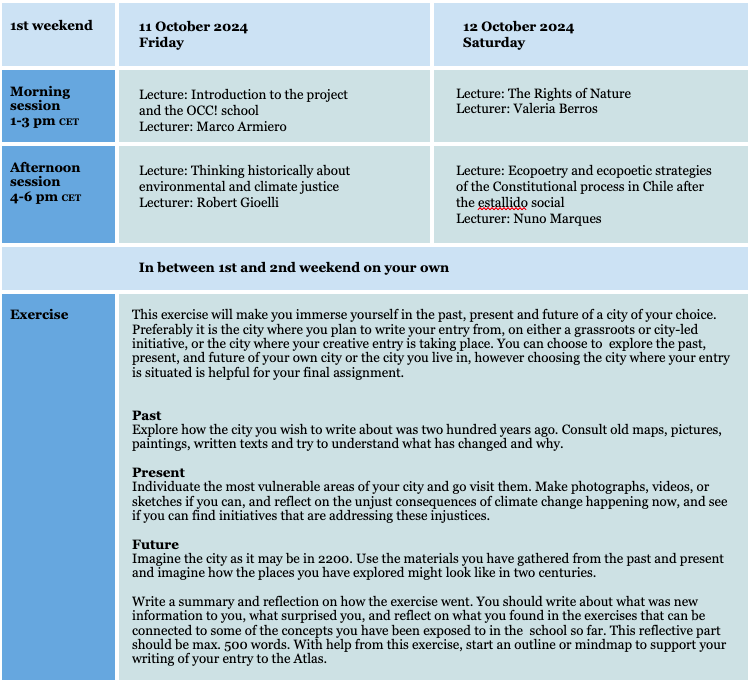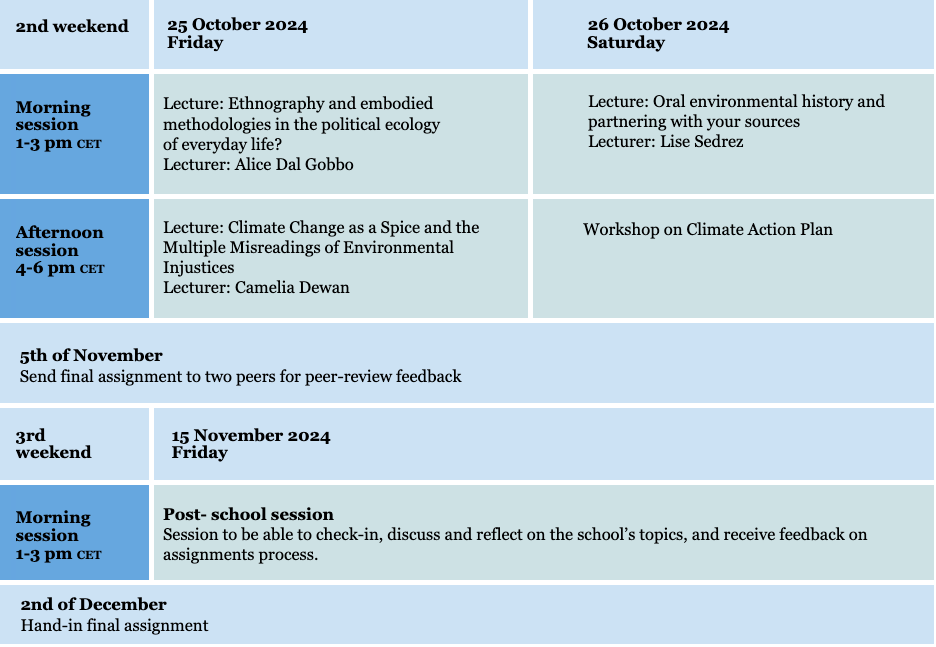Occupy Climate Change! online school 2024
DATES: 11 OCT & 12 OCT // 25 OCT & 26 OCT // 15 NOV 2024
Occupy Climate Change! invites you to an online three-weekend interdisciplinary school for early career researchers (master’s students in thesis phase, Ph.D. students, and postdocs) to explore climate change and its consequences from a climate justice, environmental humanities and political ecology perspective. The school is specifically for those interested in interdisciplinary research and direct action, urban climate justice movements and the role of counter-hegemonic imaginaries within climate change policies. Participants will contribute to the Atlas of the Other Worlds with their original research and creative works.
The school is free of tuition. New extended deadline to apply is the 15th of September 2024.
Organized by
KTH Environmental Humanities Laboratory, in Stockholm, Sweden and the Institute for the History of Science, Autonomous University of Barcelona, Spain.
in collaboration with scholars from
Institute of History, The Federal University of Rio de Janeiro, Brazil
Department of Sociology and Social Research, University of Trento, Italy
Department of Cultural Anthropology and Ethnology, Uppsala University, Sweden
Universidad Nacional del Litoral (UNL) and Consejo Nacional de Investigaciones Científicas y Técnicas (CONICET), Santa Fe, Argentina
Call for Applications
If you prefer to read the Call for Applications as PDF, you can click here.
We live in an age of loss. Breaking off ice shelves, vanishing landscapes, destroyed cultural heritage, and abandoned homes due to social, cultural, economic, political, and ecological conflicts of all sorts. The problem with loss is its intricacy with emotions, feelings, and personal attachments. Rightly so, ecological economists have spoken of the incommensurability of values in their analysis of environmental conflicts, stressing the clash between different regimes of knowledge.
One of the core challenges of climate change politics is that too many programs and policies ignore this loss, looking to address challenges in a near or far-off future. The mainstream rhetoric focuses on win-win strategies and moral efforts towards a superior common good. But many places around the world are already experiencing the damage caused by climate change and its related social, cultural and economic impacts. These are often the most vulnerable and marginalized human and more-than-human communities, and they are now facing a cascade of shocks and slow destruction.
Since 2019, Occupy Climate Change! has looked to understand how these communities, especially in cities, are experiencing this loss and damage, and trying to imagine and organize for a different future. We explore the grassroots social innovations in the urban environment and their relationships with official municipal initiatives. Science fiction writer Ursula Le Guin argued that we live in a crisis of imagination; many have said that it is easier to imagine the end of the world than imagine another world. So OCC! also looks to ignite an imaginative exploration into the future through creative writing exercises, imagining what would your home look like in 2200?
In order to build capacity and provide spaces for mutual learning on these themes, the KTH Environmental Humanities Laboratory and the Institute for the History of Science (UAB, Spain), in partnership with scholars from the Universidade Federal do Rio de Janeiro, University of Trento, Uppsala University and Universidad Nacional del Litoral are inviting early career researchers (master’s students in their advanced thesis phase, Ph.D. students, and postdocs) for an online interdisciplinary school which will include perspectives from the broadly defined fields of environmental and climate justice, environmental humanities and political ecology. The training school will include both lecture format and group-work sessions (a more detailed description of the school is below). The objectives of the course include:
- Acquiring knowledge on urban climate justice movements;
- being able to analyze how different social/ethnic groups are unequally affected by climate change;
- reflecting on the role of mainstream/counter-hegemonic imaginaries for enhancing climate change policies.
A key aspect of the school is also to contribute to the online open-access database The Atlas of the Other Worlds which is part of the OCC! project. In this database three types of materials are gathered; entries on municipal/regional/local initiatives to tackle climate change; entries on grassroots initiatives to tackle climate change; short creative stories imagining a city/town 200 years from now. Each student is requested to contribute with at least one entry (ideally two) to the Atlas of the Other Worlds, as their final assignment. Before working on the final assignment, each student must discuss the selected entry with the coordinators of the school. The entries will be revised and if accepted published in the Atlas. To learn more about the project, the Atlas, and what an appropriate entry looks like, please visit https://occupyclimatechange.net
Students admitted to the school will:
- sign a pledge committing themselves to attend the entire course and deliver the final assignment
- receive a certificate signed by the coordinators of the school stating the amount of work done during the course (equivalent to 5 ECTS);
- publish their final assignments as part of the OCC! Atlas, pending approval by the coordinators of the school.
PLEASE NOTE that for this third edition of the school, we will not be able to provide official ECTS to the students. Each student will need to ask their university for validation of the CFU, if needed.
The online school has no tuition fee.
For more information about OCC; https://occupyclimatechange.net/
For more information about the KTH Environmental Humanities Laboratory, please visit: https://www.kth.se/ehl
For the Institute for the History of Science, Autonomous University of Barcelona, please visit: https://www.uab.cat/web/institut-d-historia-de-la-ciencia-1345831710380.html
Application
To apply for the school, please send the following by 15th of September 2024 to armiero@icrea.cat
- Max. 2-page CV
- Max. 1-page motivation letter
- 250-word abstract on the final assignment. For the final assignment, you are supposed to write one or two entries for the OCC! Atlas. The entries can be:
- Entries on municipal/regional/local initiatives to tackle climate change (for instance: the city of xxx promoting cycling as an alternative to private car mobility)
- Entries on a grassroots initiative to tackle climate change (for instance: an urban gardening project in a working-class neighborhood in xxx)
- Short creative stories imagining a city/town 200 years from now (this is a creative writing exercise, imagine your city in the year 2200)
Please do not hesitate to contact us for more information about the kind of entries we wish to gather.
The selected participants will be notified by 17th of September 2024. For further information, please contact: armiero@icrea.cat
Confirmed Lecturers with respective fields of expertise
- Marco Armiero (Icrea and Institute for the History of Science, Autonomous University of Barcelona, Spain) environmental humanities and political ecology
- Robert Gioielli (KTH Environmental Humanities Laboratory) race and sustainability, environmental institutions, and urban environmental history
- Alice Dal Gobbo (Department of Sociology and Social Research, University of Trento) political ecology and everyday life
- Lise Sedrez (Instituto de História, Universidade Federal do Rio de Janeiro, Brazil) Latin American history, history of disasters, and urban environmental history
- Nuno Marques (KTH Environmental Humanities Laboratory) ecopoetics, ecopoetry in the environmental humanities, atmospheres, breathing
- Camelia Dewan, (Department of Cultural Anthropology and Ethnology, Uppsala University, Sweden) environmental anthropology, anthropology of climate change, political ecology
- Valeria Berros (Universidad Nacional del Litoral (UNL) and Consejo Nacional de Investigaciones Científicas y Técnicas (CONICET), Santa Fe, Argentina), nature’s rights, environmental law, climate litigation.
Description and schedule of the school
OCC! training school will all be online and will include online lecture sessions, seminars, and workshop activities.
The schedule below is in readable PDF here

